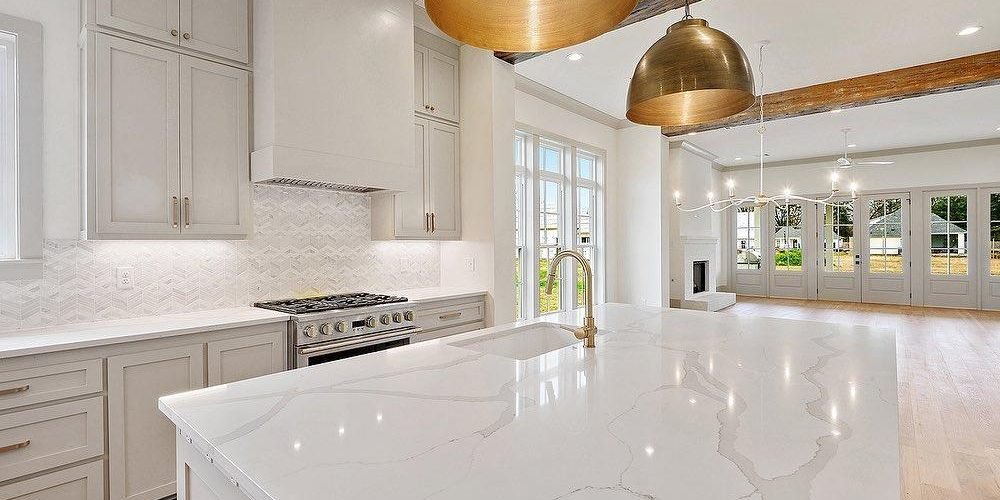The kitchen is the heart of any home, and the choice of countertop material plays a significant role in its overall design and functionality. With numerous options available in the market, it can be overwhelming to navigate through the trends and select the right material for your kitchen. In this article, we will explore the latest trends in kitchen countertops materials, providing valuable insights into their characteristics, benefits, and suitability for different styles and preferences. Whether you’re drawn to the timeless elegance of natural stone, the sleek appeal of engineered materials, or the eco-friendly options, understanding the current trends will help you make an informed decision and create a stunning and functional kitchen that reflects your unique taste and lifestyle. Join us as we delve into the world of kitchen countertop materials and discover the exciting options available for your next renovation project.
Table of Contents
Natural Stone Countertops
Natural stone countertops have long been admired for their timeless beauty and durability. They bring a touch of luxury and elegance to any kitchen, making them a popular choice among homeowners. There are several types of natural stone commonly used for countertops, including granite, marble, and soapstone, each with its own unique characteristics and aesthetic appeal.
Granite is one of the most sought-after natural stone countertop materials. Known for its strength and durability, granite is resistant to scratches and heat, making it suitable for busy kitchens. It comes in a wide range of colors and patterns, allowing homeowners to find the perfect match for their design preferences.
Marble, on the other hand, exudes sophistication and elegance. Its distinctive veining and luxurious appearance make it a favorite among those seeking a classic and refined aesthetic. However, it is important to note that marble is more susceptible to staining and requires regular maintenance to preserve its beauty.
Soapstone countertops offer a unique charm with their smooth and velvety texture. They have a rich, dark color that develops a natural patina over time, adding character to the kitchen. Soapstone is heat resistant and non-porous, making it a practical choice for food preparation areas.
One of the advantages of natural stone countertops is their ability to withstand high temperatures and resist damage from knives and other sharp objects. They also add value to the home and can last for many years with proper care and maintenance.
When considering natural stone countertops, it is essential to work with a reputable supplier and installer who can guide you in selecting the right stone for your kitchen and ensure proper installation. With their timeless beauty and durability, natural stone countertops are an excellent choice for homeowners looking to create a stunning and long-lasting focal point in their kitchen.
Engineered Stone Countertops
Engineered stone countertops have gained popularity in recent years as a versatile and low-maintenance alternative to natural stone. Also known as quartz countertops, engineered stone is composed of natural quartz crystals combined with resins and pigments to create a durable and visually appealing surface.
One of the main advantages of engineered stone countertops is their consistent color and pattern. Unlike natural stone, which can vary in appearance, engineered stone offers a wide range of colors and designs that can be customized to fit any kitchen style or preference. This consistency makes it easier for homeowners to envision their countertop’s final look.
Engineered stone is also highly durable and resistant to scratches, stains, and heat. It requires minimal maintenance, as it is non-porous and does not require sealing like natural stone. With proper care, engineered stone countertops can maintain their original beauty for many years.
Furthermore, engineered stone countertops are hygienic and food-safe, as they do not harbor bacteria or mold. This makes them an excellent choice for kitchens where cleanliness is a top priority.
In terms of sustainability, engineered stone countertops are manufactured using recycled materials, making them an eco-friendly option for homeowners who prioritize environmental responsibility.
Overall, engineered stone countertops offer a combination of durability, aesthetics, and low maintenance, making them a popular choice for homeowners seeking a reliable and stylish countertop solution for their kitchen.
Sustainable and Eco-Friendly Countertop Materials
In recent years, there has been a growing demand for sustainable and eco-friendly countertop materials as homeowners become more conscious of their environmental impact. Choosing a sustainable countertop material not only benefits the planet but also contributes to a healthier living environment.
One popular option for sustainable countertops is recycled glass. These countertops are made from post-consumer glass, such as bottles and jars, which are crushed and mixed with binders to create a beautiful and durable surface. Recycled glass countertops come in a variety of colors and patterns, adding a unique touch to any kitchen design.
Another eco-friendly choice is bamboo countertops. Bamboo is a fast-growing and renewable resource that can be harvested sustainably. It is a durable material that rivals hardwood in strength, and its natural grain adds warmth and elegance to the kitchen.
For those seeking a natural and sustainable option, wood countertops are a great choice. Wood is a renewable resource, and when sourced from responsibly managed forests, it can be an environmentally friendly option. Wood countertops offer a warm and inviting look and can be sealed with non-toxic finishes for added durability and safety.
In addition, some manufacturers offer countertops made from recycled paper or agricultural byproducts, such as wheat straw or sunflower hulls. These materials are processed and compressed to create durable and environmentally friendly surfaces.
By opting for sustainable and eco-friendly countertop materials, homeowners can contribute to a greener future while enjoying the beauty and functionality of their kitchen countertops.
Innovative and Alternative Countertop Materials
Innovation in countertop materials has paved the way for unique and alternative options that offer both style and functionality. These materials break away from traditional choices and provide homeowners with exciting possibilities for their kitchen design.
One innovative countertop material is concrete. Concrete countertops offer a modern and industrial look, with a wide range of color and texture options. They can be customized to fit any kitchen style and are known for their durability and heat resistance.
Another alternative material gaining popularity is stainless steel. Commonly found in commercial kitchens, stainless steel countertops are now making their way into residential spaces. They offer a sleek and contemporary aesthetic, are easy to clean and maintain, and are highly resistant to heat, stains, and bacteria.
For a more organic and natural option, consider using butcher block countertops. Made from thick strips of hardwood, butcher block countertops bring warmth and character to the kitchen. They are perfect for food preparation, as they provide a sturdy and forgiving surface for cutting and chopping.
In recent years, glass countertops have also emerged as a stylish and modern choice. Available in a variety of colors and patterns, glass countertops create a vibrant and luminous effect in the kitchen. They are non-porous, easy to clean, and can be backlit for a stunning visual impact.
With these innovative and alternative countertop materials, homeowners can explore new design possibilities and create a truly unique kitchen space that reflects their personal style and preferences.
Emerging Trends and Future Prospects
The world of kitchen countertop materials is constantly evolving, and emerging trends indicate exciting possibilities for the future. As technology advances and design preferences change, new materials and techniques are being introduced to meet the evolving needs of homeowners.
One emerging trend is the use of recycled materials in countertop production. With a growing emphasis on sustainability, countertop manufacturers are exploring options such as recycled glass, porcelain, and even reclaimed wood. These materials not only contribute to a greener environment but also offer unique aesthetics and textures.
Another trend on the rise is the integration of smart features into countertops. With the increasing popularity of smart homes, homeowners are seeking ways to make their kitchens more efficient and convenient. Smart countertops can incorporate wireless charging pads, integrated touchscreens, and even built-in digital assistants, transforming the kitchen into a hub of technology and connectivity.
In terms of aesthetics, minimalism, and clean lines are becoming increasingly popular. For example, sleek and seamless countertops, with minimal visible seams and edges, create a streamlined and contemporary look in the kitchen. This trend aligns with the desire for simplicity and a clutter-free environment. Moreover, you can also achieve your dream kitchen design by opting for re-designing facilities by Canada’s most in-demand kitchen remodel GraniteNations.
Looking ahead, there is also a growing interest in the use of unconventional materials such as concrete composites, ceramic surfaces, and even 3D-printed countertops. These materials offer unique textures, colors, and design possibilities, allowing homeowners to create truly customized and one-of-a-kind kitchen spaces.
As technology continues to advance and design preferences evolve, the future of kitchen countertop materials holds exciting prospects. From sustainable and recycled options to smart features and unconventional materials, the possibilities are endless, enabling homeowners to transform their kitchens into innovative and personalized spaces.
Conclusion
In conclusion, the world of kitchen countertop materials is rich with options and evolving trends. Whether it’s the timeless beauty of natural stone, the durability and versatility of engineered stone, the eco-friendly appeal of sustainable materials, or the innovative possibilities offered by alternative options, homeowners have a wide array of choices to suit their preferences and needs. As technology advances, the integration of smart features into countertops and the use of unconventional materials will continue to shape the future of kitchen design. By staying informed about the latest trends and considering factors such as durability, maintenance, and aesthetics, homeowners can make informed decisions and create stunning kitchen spaces that reflect their personal style while meeting their functional requirements. With the right countertop material, every kitchen can become a focal point of beauty, functionality, and inspiration.





